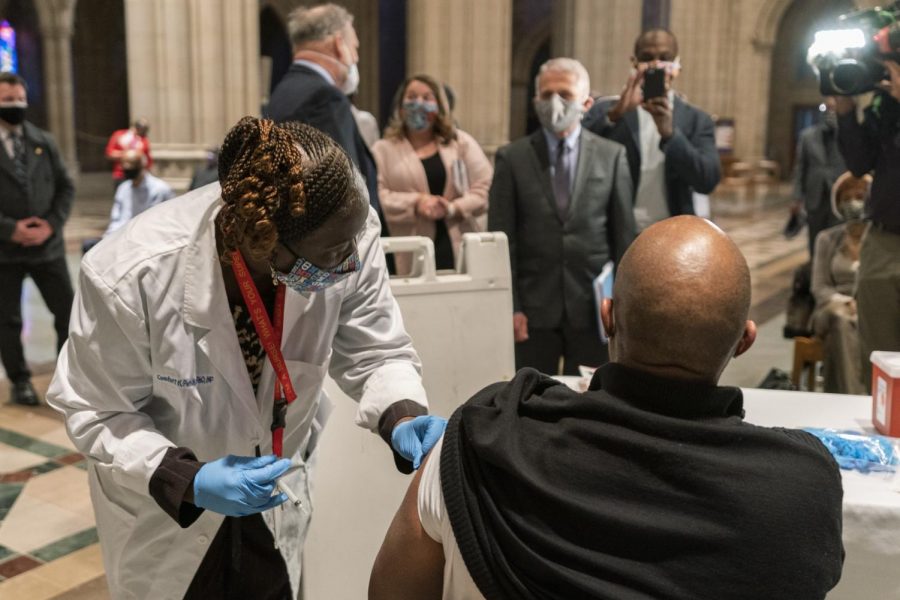Opinion: Abortion is a grave sin. Getting vaccinated is not.
Dr. Anthony Fauci, director of the National Institute of Allergy and Infectious Diseases and chief medical adviser to the president talks to Montgomery County Executive Marc Elrich, as a COVID-19 vaccine is administered to First Baptist Church of Silver Spring, Md., associate Pastor Gareth Murray and other diverse group of interfaith clergy members at the Washington National Cathedral, to encourage faith communities to get the COVID vaccine, Tuesday, March 16, 2021 in Washington. (AP Photo/Manuel Balce Ceneta)
March 25, 2021
A question has recently arisen concerning the relationship between the Johnson & Johnson vaccine and abortion. This question matters to us at Loyola because Protecting the Least Among Us: A Statement of the Society of Jesus in the United States on Abortion, issues a resounding call to all those who work in or attend Jesuit institutions: “Our common calling is to stand in solidarity with the unborn, the ‘least of our brothers and sisters’ (Matthew 25:40), through prayer and political activism. It is our desire that Jesuits, along with their colleagues, will continue to offer a consistent message of respect for life, especially for unborn children.”
We as a Jesuit and Catholic university must acknowledge the sad reality that the evil of abortion affects more of our day-to-day life than we can often imagine. Bringing about an end to abortion is an urgent social justice obligation.
It is out of this profound concern for the absolute dignity of human life that the archbishop of New Orleans has advised Catholics that the “Johnson & Johnson is morally compromised as it uses the abortion-derived cell line in development and production of the vaccine as well as the testing.” His statement then clarifies that the decision to receive this vaccine is “one of individual conscience.”
The bishop of Baton Rouge has issued a similar statement, but with a different emphasis: “Given our present situation and the need to protect ourselves and one another from this virus, my guidance to the faithful of the Diocese of Baton Rouge is to accept as your first choices the vaccines created by Pfizer and Moderna, but if for any reasonable circumstance you are only able to receive the vaccine from Johnson & Johnson, you should feel free to do so for your safety and for the common good.”
It is important explicitly to clarify that neither statement makes a claim about the moral culpability of those receiving the Johnson & Johnson vaccine.
It is not a sin to receive this vaccine.
In fact, it may be the right thing to do since, as the bishop of Baton Rouge notes, “Being vaccinated should be considered as an act of charity toward others in our communities.” The concern is that the use of this vaccine may encourage researchers to use human fetal tissue derived from abortions, thus encouraging and supporting the abortion industry.
As far as I understand, however, the use of an abortion-derived cell line from the 1970’s, like the use of a homicide-derived cell line, is not a morally compromising action.
The cell lines being using to test vaccines are not from human beings deliberately aborted for the purpose of research. Yes, we must remain vigilant that no incentive be provided for aborting human beings for the sake of vaccine development. But the fact of the use of an abortion-derived cell line is no more problematic than the use of a homicide derived cell line as long as the abortion – or homicide – was not performed for the sake of the research. In fact, it is even less problematic, since the cells being used now for testing are derived from the original cell line but are not part of the original aborted human being. My further concern, echoing bioethicist Gilbert Meilaender, is that “this kind of opposition to COVID-19 vaccines is likely to harm the pro-life cause, limiting its scope to an increasingly small core of true believers.” Our bishop has given us counsel and then has asked us to follow our consciences. I share his passion for the cause of life even as I continue to strive to understand this complex issue.







